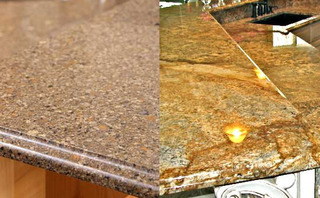
It is crafted mainly since its final product can change in color, appearance, and consistency-- all of which depends on resins and the other parts integrated with the quartz. If you go with quartz, you will most likely have a more even color pattern on your countertops than you would with granite.
No bargains with either product.
If you wish to save money, go in other places - laminate being your best bet. Due to the fact that both are sourced overseas, prices of quartz and granite countertops continuously shift. All these items are container-shipped throughout oceans, and this depends on petroleum rates.
Quartz: From $67 to $93 per square foot, installed. Cost of a normal quartz counter setup, included 28 square feet of Zodiaq Abyss Black with 5 square feet of similar-material bevel edged backsplash, and a cut-out produced a double-bowl sink, will have to do with $2,219 to $3,081.
Toughness
Quartz: Engineered stone has the defects engineered out. You will not find invisible striations simply waiting to crack open some day, as you will certainly find with piece granite. Due to the presence of the resins, quartz counters are less prone to staining.
Granite: Natural slab granite, for all its appeal, has imperfections and imperfections that house owners either love, accept, or hate. Granite spots if subjected to red wine.
Granite and quartz are similar in that they can be utilized as the basic material for countertops that is resistant to discolorations and scratches, but they have a number of differences. To begin with, granite is a natural stone that comes straight out of the earth, and quartz is engineered, or "manufactured". Quartz is a crystalline material much like feldspar, while granite is in fact made of quartz and feldspars.
Well, quartz is less porous, so there is a lower opportunity that food and water can end up being caught in the surface. Granite wins visually considering that it represents the most natural color patterns and developments.
Refined granite has a shine and beauty that rivals a few of the more pricey types of marble tiles. Even polished marble, (in addition to limestone and travertineare for that matter) is softer than granite. They too can be harmed by acidic compounds (such as vinegar, citrus beverages, and food condiments like mustard and ketchup. These acids can dull a refined surface area or rough up a honed finish if not swiftly cleaned away.
While the trendy stainless steel countertop is hailed in lots of an expert kitchen area, it can quickly be scratched and dented. It's really pricey to boot. Further, stainless steel is really industrial looking, it can quickly show scratches.
And if considering a "granite-look" countertop be aware that they are actually made of limestone or dolomite which is included calcium and magnesium carbonates. This can actually dissolve when in contact with acidic food products such as vinegar, tomatoes, lemons etc. So countertops constructed from acrylic and other manufactured products can be made to look like granite, the resemblances definitely do stop there.
Industry professionals likewise state that a granite countertop is a high-density, almost impenetrable stone which makes it a best material for kitchen area countertops. Polished granite must be cleaned after each use with a granite cleaner or utilizing a liquid dish-soap, soap flakes or powder.
 RSS Feed
RSS Feed